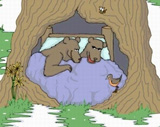|
 Black bears, hummingbirds and squirrels hibernate in the
winter because a long, chilly season of little food and warmth is no
picnic for these animals. Black bears, hummingbirds and squirrels hibernate in the
winter because a long, chilly season of little food and warmth is no
picnic for these animals.
Unlike the warm seasons of spring and summer that provide an
unlimited amount of food for these
critters, the winter season only provides a cold, frozen
ground where food is extremely scarce.
In addition, the wintery days are frigid and short while the
hours in the dark night seem to drag on for a chilly eternity.
Searching for grub often leaves the
stomachs of these animals empty because by the end of their search
their bodies end up burning more calories than the animals get back
from the food when and if any is found. So instead of starving or
freezing to death, these animals decide to pack in all in for the
long haul and hibernate during the winter months.
Hibernation helps these animals survive in the roughest and
toughest conditions. By hibernating, an animal decreases its body‘s
energy needs to a bare minimum. Hibernation is a process of lowering
an animals body temperature and slowing down its heartbeat into
order to conserve energy during times
of scarcity and stress.
Every animal hibernates in different ways. While squirrels can
wake up every four days to grab a bite to eat and take a trip to the
bathroom, black bears can stay dormant, or inactive, for up to seven
months with no food, water, or visits to the bathroom.
|